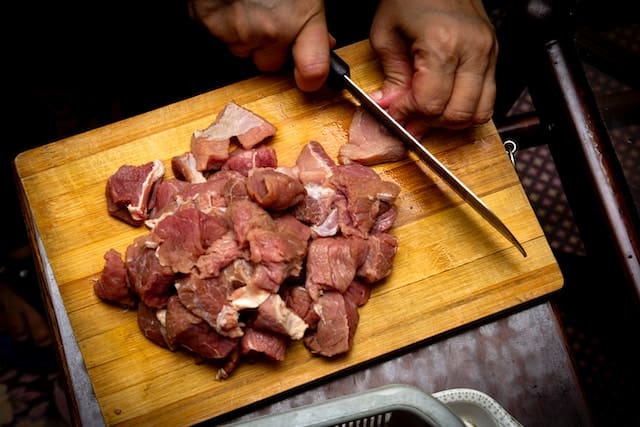Are you ready to dive into the world of the carnivore diet? This comprehensive guide will provide you with all the information you need to understand, explore, and embrace this unique way of eating. We’ll break down the science behind the carnivore diet, discuss its benefits and risks. And guide you in building your very own carnivore diet food list. Plus, we’ll help you navigate the grocery store and provide meal planning tips to make your carnivore journey a smooth and enjoyable one. We’ll give you the ultimate carnivore diet food list. So, buckle up and get ready to embark on a carnivorous adventure!
Understanding the Carnivore Diet:
The Science Behind the Carnivore Diet
Before we delve into the specifics of the carnivore diet food list, let’s take a moment to understand the science behind this unique eating plan. The carnivore diet is based on the principle of consuming only animal products. Such as meat, seafood, eggs, and dairy, while excluding all plant-based foods. Proponents of this diet believe that humans are biologically designed to thrive on animal foods, as our ancestors did for thousands of years.
When we look back at our early human ancestors, we see that they relied heavily on hunting and gathering for their sustenance. They consumed a diet rich in animal protein and fat. Which provided them with the energy and nutrients needed to survive and thrive. This evolutionary perspective forms the foundation of the carnivore diet.
By eliminating plants and their potential toxins, it is believed that the carnivore diet can improve digestion. It also enhance mental clarity, promote weight loss, and even alleviate certain health conditions. The theory is that our bodies may have difficulty digesting certain plant compounds. Such as lectins and phytates, which can cause inflammation and digestive issues in some individuals. By removing these potential irritants, the carnivore diet aims to optimize gut health and overall well-being.
However, it’s important to note that while some studies suggest potential benefits, the carnivore diet is still considered controversial in the scientific community. And more research is needed to fully understand its long-term effects. Critics argue that the exclusion of plant-based foods may lead to nutrient deficiencies. As plants provide important vitamins, minerals, and fiber that are essential for overall health.
Benefits and Risks of the Carnivore Diet: The Ultimate Carnivore Diet Food List
Like any diet, the carnivore diet comes with its own set of benefits and risks. Let’s take a closer look at what you can expect when following this way of eating.
One of the primary benefits reported by carnivore diet followers is weight loss. By eliminating carbohydrates and focusing on protein and fat, the body can enter a state of ketosis, where it burns stored fat for fuel. This can lead to significant weight loss and improved body composition.
In addition to weight loss, many individuals on the carnivore diet report improved mental clarity and increased energy levels. Some proponents believe that this is due to the elimination of potential allergens and irritants found in plant-based foods. Which can cause brain fog and fatigue in some individuals.
Furthermore, the carnivore diet is low in processed foods and added sugars, which can contribute to improved blood sugar control and reduced inflammation. By eliminating these dietary culprits, individuals may experience better blood sugar regulation. And a reduction in chronic inflammation, which are both important factors in maintaining overall health.
Benefits and Risks of the Carnivore Diet: The Ultimate Carnivore Diet Food List
However, it’s important to note that the exclusion of plant-based foods may lead to nutrient deficiencies. Plants provide important vitamins, minerals, and fiber that are essential for overall health. While carnivore diet proponents argue that animal foods can provide all the necessary nutrients, critics suggest that a well-rounded diet that includes a variety of plant-based foods is still the best way to ensure optimal nutrition.
Additionally, the long-term effects of the carnivore diet on heart health and gut microbiome are still not fully understood. Some studies suggest that a diet high in animal products may increase the risk of heart disease, while others argue that the high fat and protein content can have a positive impact on heart health. Similarly, the impact of the carnivore diet on the gut microbiome, which plays a crucial role in overall health, is still a topic of ongoing research.
In conclusion, while the carnivore diet may offer certain benefits such as weight loss and improved mental clarity, it is important to approach this way of eating with caution. It is always recommended to consult with a healthcare professional or registered dietitian before making any significant changes to your diet, especially one as restrictive as the carnivore diet.
Building Your Carnivore Diet Food List
Essential Meats and Seafood
When it comes to building your carnivore diet food list, your main focus should be on high-quality meats and seafood. Grass-fed beef, lamb, pork, and wild-caught fish are excellent choices. These sources are rich in protein, healthy fats, vitamins, and minerals that are crucial for your body’s optimal functioning.
Remember to choose fatty cuts of meat, as they provide a good source of energy and help you feel satiated. Opting for organ meats like liver, kidney, and heart is also highly beneficial, as they are packed with essential nutrients like vitamin A, iron, and B vitamins.
Eggs and Dairy in the Carnivore Diet
In addition to meat and seafood, eggs and dairy products can also be included in the carnivore diet. Eggs are a complete source of protein and contain essential vitamins and minerals. Dairy products like cheese, butter, and full-fat cream provide an additional source of healthy fats and can add flavor to your meals.
However, it’s important to note that not everyone tolerates dairy well, so listen to your body and adjust your food choices accordingly. If you experience any negative reactions, consider eliminating or reducing dairy from your carnivore diet.
Organ Meats: The Superfoods of the Carnivore Diet
If you truly want to maximize the nutrient density of your carnivore diet, don’t overlook the power of organ meats. Liver, in particular, is often referred to as nature’s multivitamin, as it contains high amounts of vitamin A, iron, B vitamins, and other essential nutrients. Include organ meats as part of your regular carnivore diet meal plan to reap their incredible health benefits.
Navigating the Grocery Store for Carnivore Diet: The Ultimate Carnivore Diet Food List
Best Places to Shop for Carnivore Diet Foods
When embarking on the carnivore diet, you might wonder where to shop for all your animal-based foods. Luckily, most grocery stores offer a wide selection of meats, seafood, and eggs to choose from. Look for high-quality, organic, and grass-fed options whenever possible. Depending on your location, you may also find specialty butchers or farmers’ markets that offer a variety of high-quality animal products.
Reading Labels for Carnivore Diet Compliance
While the carnivore diet primarily revolves around whole foods, it’s still important to read labels to ensure compliance. Some processed foods may contain additives, fillers, or hidden sources of carbohydrates that may not align with the carnivore diet principles. Be on the lookout for hidden sugars, grains, or vegetable oils that may sneak into packaged meat products. Stick to the basics: fresh, unprocessed meats and seafood for the best results.
Meal Planning and Preparation for the Carnivore Diet
Simple Carnivore Diet Recipes
Preparing carnivore diet-friendly meals doesn’t have to be complicated. Opt for simple recipes that let the natural flavors of the meat shine. Sear a juicy steak, grill some succulent salmon, or roast a whole chicken until it’s crispy and golden. Experiment with different seasonings, herbs, and spices to add variety to your meals while keeping them satisfying and delicious.
Don’t be afraid to get creative with your food choices. You can make homemade bone broth for added nourishment, try your hand at making pâté from organ meats, or whip up a batch of scrambled eggs loaded with butter for a high-fat, protein-packed breakfast.
Tips for Cooking Meat and Seafood
Cooking meat and seafood to perfection is a skill that can enhance your carnivore diet experience. Here are a few tips to ensure your meals are delicious and enjoyable:
- Invest in a reliable meat thermometer to ensure your meats are cooked to the desired level of doneness.
- Experiment with various cooking methods such as grilling, baking, broiling, or pan-searing to add variety and different flavors to your meals.
- Let meat rest before serving to allow the juices to redistribute and ensure maximum tenderness.
- Season your meats with salt, pepper, and other herbs or spices of your choice to enhance their natural flavors.
Addressing Common Questions and Misconceptions
Can You Eat Plants on the Carnivore Diet?
No, the carnivore diet strictly prohibits the consumption of all plant-based foods. The primary focus is on animal products, such as meat, seafood, eggs, and dairy. The underlying belief is that humans are optimized to thrive on these animal-based sources of nutrition and that plants are unnecessary for optimal health.
Is the Carnivore Diet Sustainable Long-Term?
The long-term sustainability of the carnivore diet is a subject of debate. While some individuals have thrived on this way of eating for an extended period, it’s important to consider individual biochemistry, nutrient requirements, and overall health goals. As with any diet, it’s always wise to consult with a healthcare professional or registered dietitian before making any long-term changes to your eating habits.
With the ultimate carnivore diet food list at your fingertips, you’re now equipped to embark on this unique journey. Remember, the carnivore diet is not for everyone and it’s crucial to listen to your body and monitor your health throughout the process. Happy carnivorous eating and may your plates be filled with delicious animal-based nourishment!




